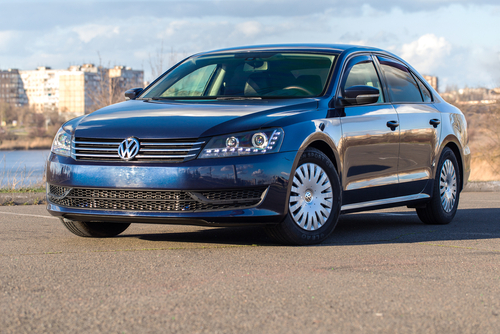Replacing the rear brake pads on a Volkswagen Passat can vary in cost based on the model year and other factors like location and the choice between dealership service or an independent shop.
Here’s a breakdown of the typical costs by model year for a VW Passat:

| Model Year | Typical Replacement Cost (Including Labor) |
|---|---|
| 2000 – 2005 | $150 to $250 |
| 2006 – 2010 | $200 to $300 |
| 2011 – 2015 | $250 to $350 |
| 2016 – 2020 | $300 to $400 |
| 2021 – Present | $350 to $450 |
Key Details:
- Parts Cost: The cost of brake pads can range from $50 to $150, depending on whether they are OEM (Original Equipment Manufacturer) parts or aftermarket options, which can be less expensive.
- Labor Costs: Labor costs can vary significantly based on geographic location and the specific service provider. Dealerships might charge more for labor than independent shops.
- Additional Services: During brake pad replacement, it’s also common for the brake rotors to be inspected, and they may need to be replaced or resurfaced, which can increase the overall cost.
- Warranty and Quality: Choosing higher-quality or OEM brake pads can increase upfront costs but may offer better longevity and performance, which can be cost-effective in the long run.
For the most accurate estimate, it’s advisable to get quotes from several local repair shops or dealerships, and to consider the condition of related brake components which may also need service.
The Volkswagen Passat is a mid-sized sedan that has been in production since 1973. Over the years, it has found a niche among drivers who appreciate its blend of functionality and comfort. Here’s a quick guide to the various aspects of the VW Passat models:
Generations: The Passat has evolved through numerous generations, with each offering advancements in technology, safety, and performance. The models range from the first generation (B1), introduced in the 1970s, to the latest generation (B8), which debuted in 2014.
- B1 (1973–1981)
- B2 (1981–1988)
- B3 & B4 (1988–1997)
- B5 & B5.5 (1996–2005)
- B6 (2005–2010)
- B7 (2010–2015)
- B8 (2015–Present)
Performance: Recent models of the Passat come equipped with various engine options, including TSI petrol and TDI diesel engines. Your choice would depend on the desired balance between efficiency and power.
Features: The Passat’s interior boasts a spacious and ergonomic design. You often find features like touchscreen infotainment systems, climate control, and advanced driver-assist systems that enhance safety for you and your passengers.

Market Position: It positions itself as a practical choice for sedan buyers looking for German engineering without the luxury car price tag. The Passat competes in a segment with heavyweights like the Honda Accord and Toyota Camry.
Aftermarket and Maintenance: When maintaining your Passat, the cost of parts, such as rear brake pads, may vary based on your model year and the specific engine type. Sourcing original equipment manufacturer (OEM) or aftermarket parts will affect your maintenance costs.
Rear Brake Pad Replacement Costs
Replacing the rear brake pads on your VW Passat is an important maintenance task that ensures your vehicle remains safe and effective on the road. It can involve various costs, including the price of the brake pads themselves and the labor to fit them.
OEM vs Aftermarket Brake Pads
OEM Brake Pads
- Cost: Typically range between $50-$120
- Durability/Quality: Designed to meet the specifications of your VW Passat
OEM (Original Equipment Manufacturer) brake pads are made specifically for your vehicle by the manufacturer. They usually cost more but offer a guaranteed fit and performance.
Aftermarket Brake Pads
- Cost: Generally range from $20-$90
- Variety: Wider selection with varying levels of quality
Aftermarket brake pads can be less expensive and come in a variety of types suited for different driving styles. However, quality can vary, and they may not have the exact fit of OEM pads.
Labor Costs for Rear Brake Pad Replacement
- Hourly Rate: Most mechanics charge an hourly rate from $50-$100.
- Total Time: Replacement typically takes around 1 to 2 hours.
The cost of labor for replacing your rear brake pads will depend on the hourly rate of the mechanic and the time it takes to complete the job. Be sure to get a quote beforehand, as rates can vary between service providers.
Factors Influencing Brake Pad Replacement Cost
The cost of replacing the rear brake pads on your VW Passat can vary widely. Key factors such as your vehicle’s model year, the type of brake pad material, regional cost differences, and additional replacement services can greatly influence the total price.
Vehicle Model Year
The model year of your VW Passat affects the price of brake pad replacements. Newer models may require more sophisticated pad types or incorporate advanced braking systems that increase the cost. For instance:
- 2018-2022: High-end composite materials
- 2012-2017: Standard metallic or ceramic pads
Brake Pad Material
Brake pads are made from different materials, each offering varied performance and wear characteristics. Your choice directly impacts the cost.
- Organic: Less expensive, softer, and quieter but wear out faster
- Metallic: Mid-priced, more durable, but may be noisier
- Ceramic: Higher cost, optimum balance between durability and noise level
Region and Cost of Living
Where you live plays a significant role in the cost of brake pad replacement.
- Urban areas: Higher labor and shop fees
- Rural regions: Potentially reduced costs due to lower overheads
Additional Services During Replacement
During the replacement of brake pads, additional services may be recommended.
- Rotor resurfacing or replacement: Adds to the overall expense
- Brake fluid change: Increases total service cost
By considering these factors, you can estimate the costs you might incur for replacing the rear brake pads on your VW Passat.




